
Motivation and inspiration are two powerful forces that fuel our actions and shape our lives. While both terms are often used interchangeably, they have distinct meanings and serve as unique sources of empowerment. In this blog post, we will explore the differences between motivation and inspiration and how understanding these concepts can help us achieve our goals and lead a more fulfilling life.
What is Motivation: The Fuel for Our Actions
Motivation can be defined as the driving force behind our actions, behaviors, and choices. It is the internal or external stimulus that inspires us to pursue our goals and desires. Motivation can come in various forms, such as the desire for success, financial rewards, recognition, personal growth, and the satisfaction of achieving something meaningful.
Motivation plays a crucial role in our lives, as it provides us with the energy and enthusiasm to overcome obstacles, take on challenges, and persist through difficult times. It is the fuel that powers our actions and enables us to achieve our aspirations.
It is a psychological state that arises from various internal and external factors, such as personal desires, beliefs, or rewards.
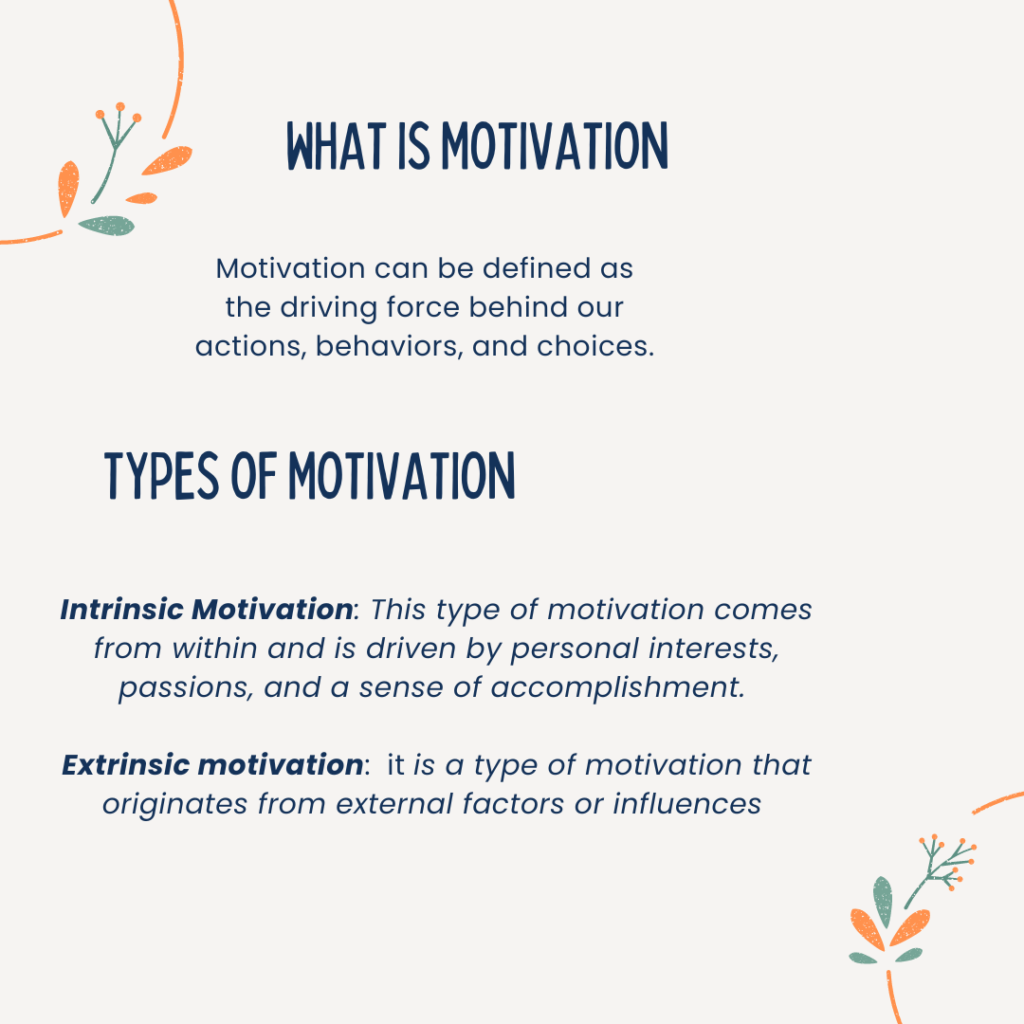
Motivation can be categorized into two types:
What is Intrinsic Motivation
This type of motivation comes from within and is driven by personal interests, passions, and a sense of accomplishment. For example, pursuing a hobby or learning a new skill because it brings joy and satisfaction.
Intrinsic motivation is often seen as a more sustainable and fulfilling form of motivation than extrinsic motivation, as it is driven by personal values and interests rather than external pressure or incentives. It is driven by personal interests, passions, and a sense of accomplishment.
When we are intrinsically motivated, we engage in an activity because we find it rewarding or enjoyable in and of itself rather than for external rewards or recognition. Examples of activities that can be intrinsically motivating include hobbies, creative pursuits, learning new skills, or pursuing a career that aligns with our passions and interests.
Research has shown that intrinsic motivation can lead to better performance, increased creativity, and higher engagement and satisfaction levels. By identifying and incorporating our intrinsic motivations into our lives, we can cultivate a sense of purpose and fulfillment that drives us toward our goals and aspirations.
Some ways to foster intrinsic motivation include setting achievable goals that align with our personal values, seeking out challenges that stretch our abilities, and focusing on the process of learning and growth rather than just the outcome. By prioritizing our intrinsic motivations, we can lead more fulfilling and rewarding lives.
Extrinsic Motivation
Extrinsic motivation is a type of motivation that originates from external factors or influences rather than from an individual’s personal interests or passions. It is driven by rewards, recognition, or the avoidance of negative consequences. When we are extrinsically motivated, we engage in an activity because of the potential outcomes, such as praise, monetary gain, or the prevention of unfavorable situations, rather than the inherent enjoyment or interest in the activity itself.
Extrinsic motivation can be useful in certain situations, such as encouraging individuals to complete tasks or achieve goals that might not be inherently enjoyable or aligned with their passions. Examples of extrinsic motivators include working for a promotion, earning praise from others, competing in contests, or avoiding penalties for not completing a task.
However, relying solely on extrinsic motivation can sometimes be problematic, as it may lead to a decrease in intrinsic motivation, lower levels of creativity, and diminished long-term satisfaction. To maintain a healthy balance, it’s essential to recognize and nurture intrinsic motivation while also leveraging extrinsic motivators when appropriate.
Some ways to effectively utilize extrinsic motivation include setting clear goals and expectations, providing praise and recognition for achievements, and offering rewards or incentives that are meaningful and relevant to the individual. By understanding the role of extrinsic motivation and applying it judiciously, we can support and encourage personal growth and success in ourselves and others.
Inspiration: The Spark That Ignites Our Soul
Inspiration, on the other hand, is an emotional state that elevates our spirit and sparks a sense of purpose. It often stems from witnessing or experiencing something that resonates deeply within us, such as a powerful speech, a beautiful piece of art, or an act of kindness. When we are inspired, we feel a sense of awe, admiration, and a desire to emulate or contribute to the source of our inspiration.
Unlike motivation, inspiration is not goal-oriented. Instead, it catalyzes creativity, innovation, and self-improvement. It transcends the boundaries of self-interest and encourages us to connect with something greater than ourselves.
What is the Role of Inspiration?
The role of inspiration is to provide a sense of purpose, passion, and direction that drives individuals toward their goals and aspirations. Inspiration is an emotional and intuitive force that transcends logic and reason, motivating individuals to pursue their dreams, create something new, or positively impact the world.
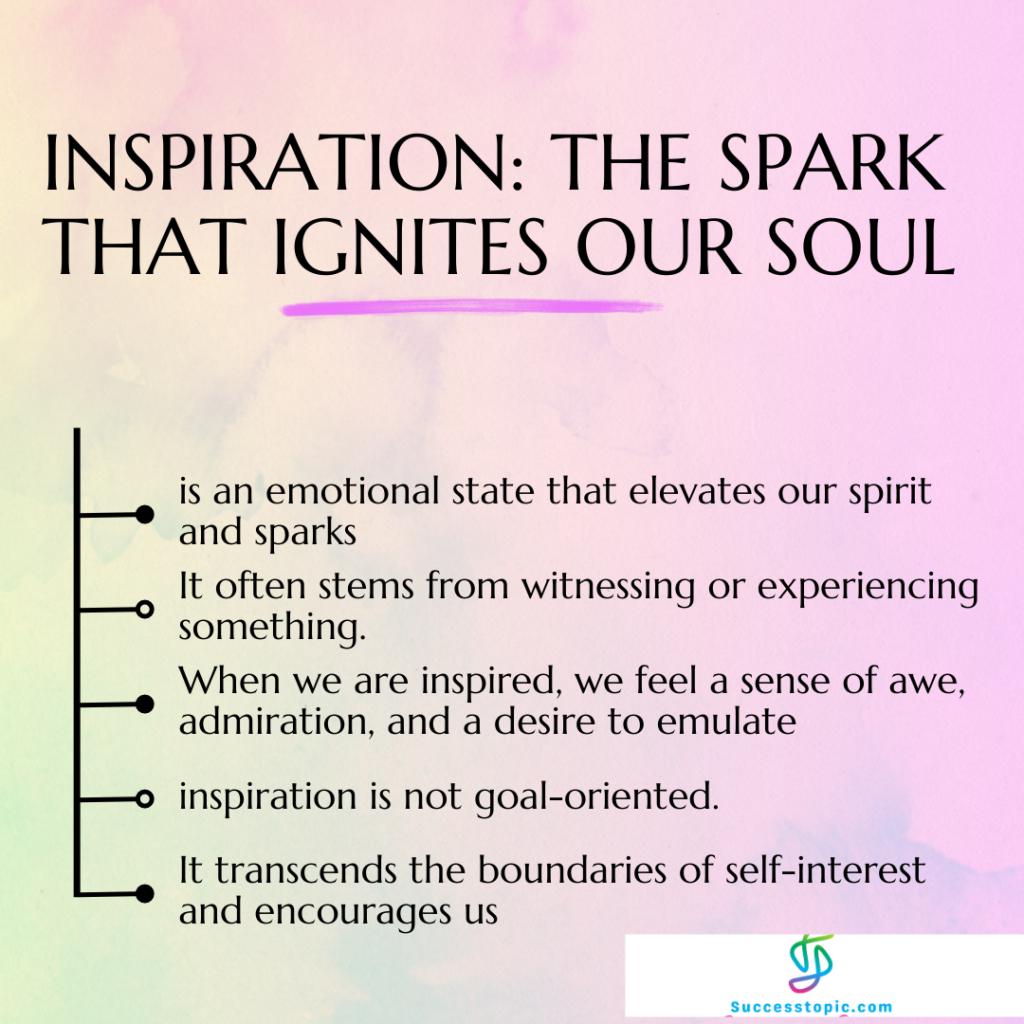
Here are some specific roles that inspiration plays:
Sparks creativity and innovation
Inspiration often sparks creativity and innovation, encouraging individuals to think beyond their limitations and explore new ideas or approaches. Inspiration can provide the initial spark for a new project or idea, leading to breakthroughs and inventions.
Provides a sense of purpose and meaning for motivation and inspiration
Inspiration can provide a sense of purpose and meaning in life, guiding individuals toward their passions and values. It can help individuals clarify their goals and aspirations, fostering a sense of fulfillment and satisfaction.
Fosters personal growth and development
Inspiration can foster personal growth and development by providing a broader perspective on life and the world. It can help individuals overcome obstacles and challenges, leading to self-improvement and resilience.
Drives social and environmental change
Inspiration can drive social and environmental change by motivating individuals to impact the world positively. It can fuel activism, philanthropy, and volunteerism, leading to a better world for all.
Enhances well-being and happiness
Inspiration can enhance well-being and happiness by instilling a sense of hope, optimism, and positivity. It can counteract negative emotions such as fear, doubt, and anxiety, leading to a more fulfilling and joyful life.
Motivation Vs. Inspiration
Motivation and inspiration are two related but distinct psychological forces that drive human behavior and personal growth. While both are important for achieving goals and fostering personal development, their origins, focus, and longevity differ. Understanding the differences between motivation and inspiration can help individuals harness these forces effectively to enhance their lives and accomplish their aspirations.
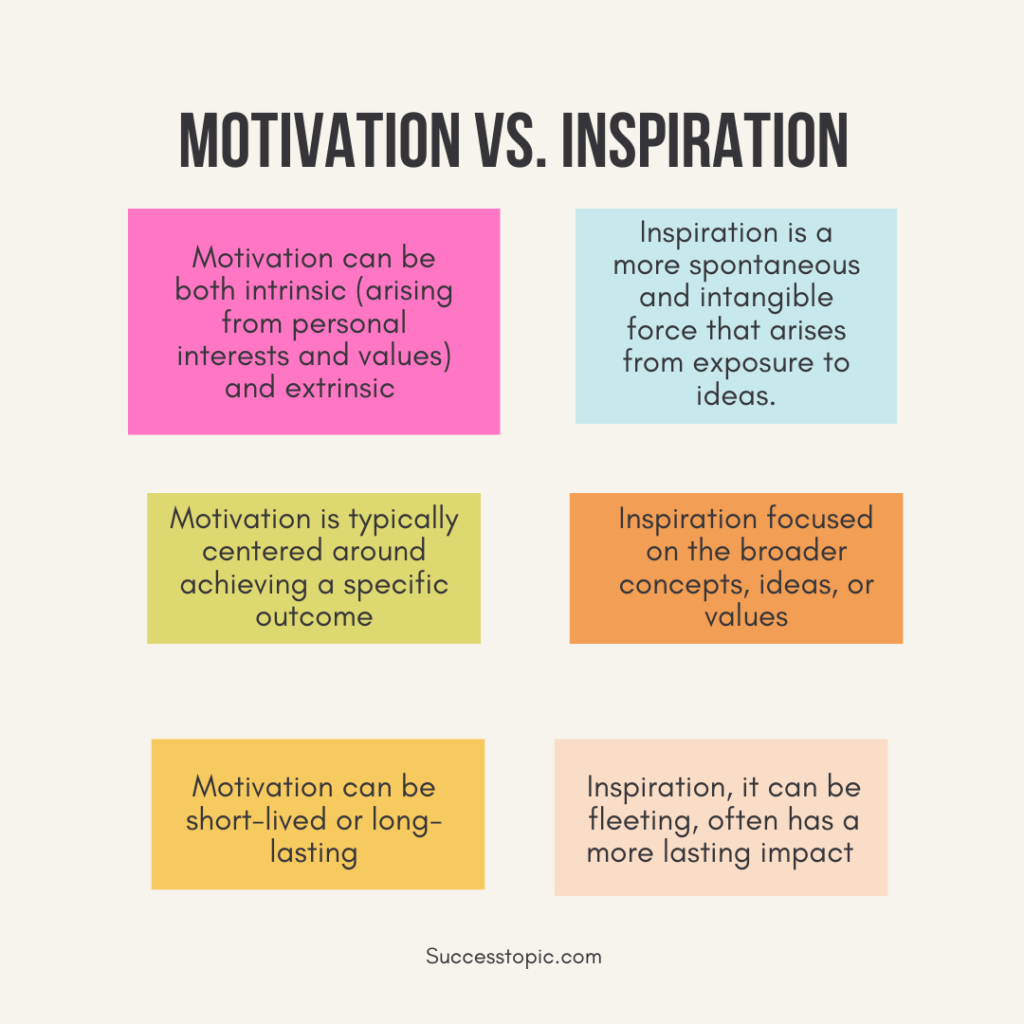
Origins
Motivation can be both intrinsic (arising from personal interests and values) and extrinsic (stemming from external factors such as rewards or recognition). It is often goal-oriented and relies on specific factors to propel action. On the other hand, inspiration is a more spontaneous and intangible force that arises from exposure to ideas, people, or experiences that resonate with one’s core values or provoke a sense of awe and admiration.
Focus
Motivation is typically centered around achieving a specific outcome or goal, such as completing a task, pursuing a career, or overcoming a challenge. It is driven by the desire for personal accomplishment or to avoid negative consequences. Inspiration, however, is more focused on the broader concepts, ideas, or values that evoke a sense of purpose or passion within an individual, often transcending specific goals or tasks.
Longevity Vs. Motivation and inspiration
Motivation can be short-lived or long-lasting, depending on the factors driving it and the individual’s level of commitment to their goals. Intrinsic motivation tends to be more enduring, while extrinsic motivation may wane once the external factors are no longer present. Inspiration, though it can be fleeting, often has a more profound and lasting impact on an individual’s mindset, perspective, and overall approach to life.
Role of Motivation and Inspiration
Motivation and inspiration are two powerful psychological forces that play crucial roles in personal and professional development, fostering growth, creativity, and achievement. They complement each other and contribute to an individual’s success in various ways:
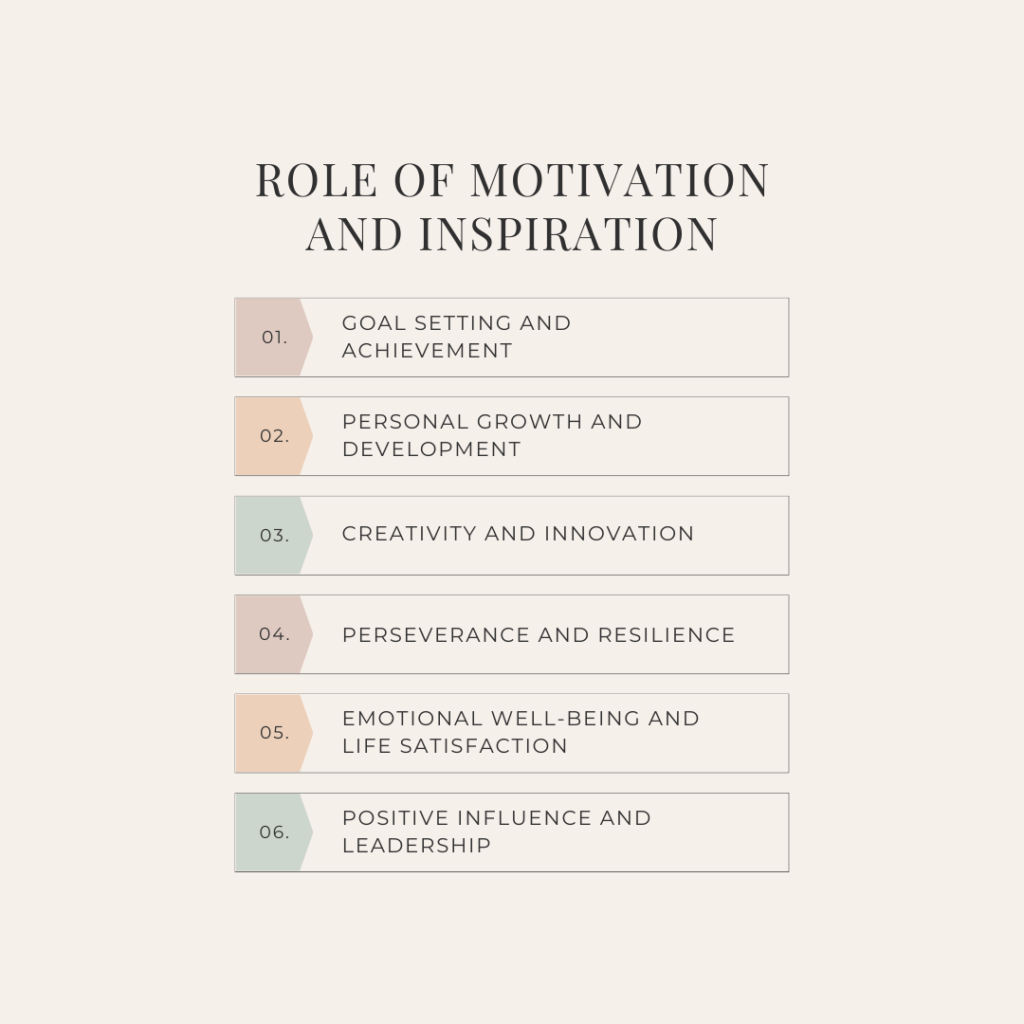
Goal setting and achievement
Motivation drives individuals to set goals and take actionable steps to achieve them. Both intrinsic and extrinsic motivation push people to overcome obstacles and stay committed to their objectives. Inspiration, on the other hand, provides a sense of purpose and passion that guides individuals in setting meaningful and ambitious goals that align with their values and aspirations.
Personal growth and development
Motivation propels individuals to continuously learn, improve, and adapt to pursue their goals, leading to personal growth and development. Inspired individuals often seek to emulate the qualities of those who inspire them, fostering self-improvement and the pursuit of excellence in their own lives.
Creativity and innovation
Inspiration often sparks creativity and innovation, encouraging individuals to think beyond their limitations and explore new ideas or approaches. Motivation then fuels the drive to bring these creative ideas to fruition, turning abstract concepts into tangible outcomes.
Perseverance and resilience
Motivation helps individuals develop resilience and perseverance in the face of challenges as they remain focused on achieving their goals despite setbacks. Inspiration, too, can foster resilience by providing a sense of purpose and a broader perspective that allows individuals to maintain their optimism and determination even in difficult circumstances.
Emotional well-being and life satisfaction
Both motivation and inspiration contribute to overall emotional well-being and life satisfaction. Motivation, particularly intrinsic motivation, leads to a sense of accomplishment and personal growth, while inspiration instills a sense of meaning and purpose in life.
Positive influence and leadership
Inspired individuals often have a contagious enthusiasm and passion that positively impacts those around them. Motivated and inspired individuals who lead by example can inspire others to strive for excellence and develop their own motivation and inspiration.
Can We Combine Motivation and Inspiration?
Yes, we can combine motivation and inspiration to enhance personal and professional growth, drive success, and lead a more fulfilling life. By harnessing both forces, individuals can benefit from the goal-oriented nature of motivation and the broader, purpose-driven aspects of inspiration. Here’s how to combine motivation and inspiration effectively:
Align goals with values and passions
Set goals that not only address practical needs but also align with your core values, passions, and aspirations. This approach ensures that both motivation and inspiration work in tandem, creating a strong foundation for achievement and personal growth.
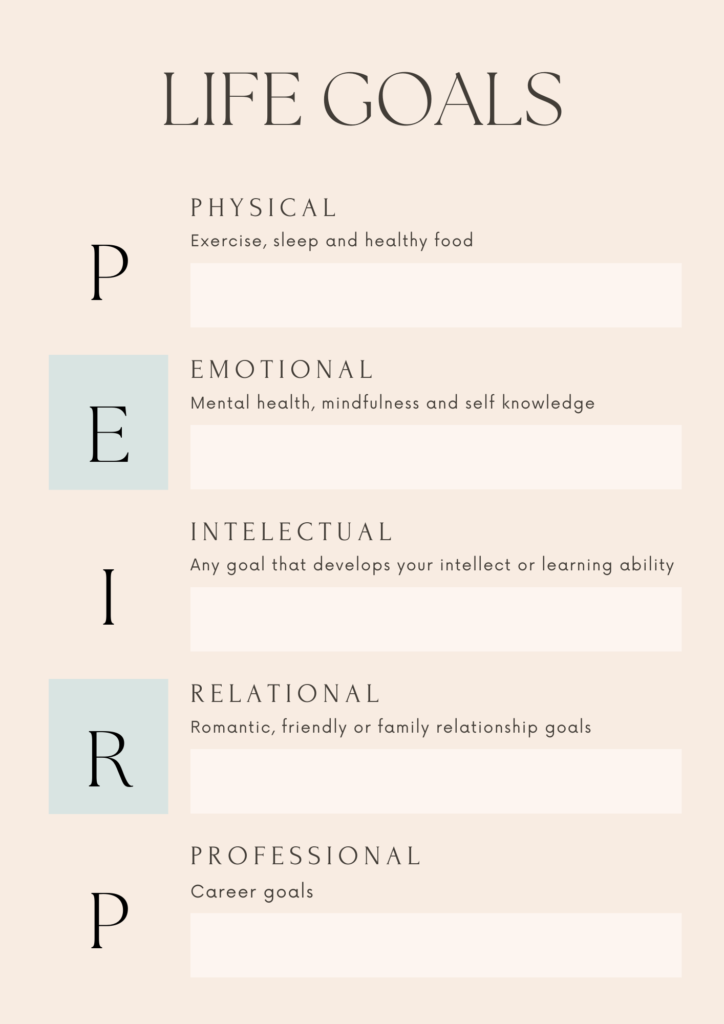
Seek out sources of inspiration.
Actively seek out sources of inspiration, such as role models, books, podcasts, workshops, or experiences that resonate with your values and passions. These sources can ignite your creativity, broaden your perspective, and provide a renewed sense of purpose that complements your motivation.
Cultivate intrinsic motivation
Focus on developing intrinsic motivation by engaging in activities that genuinely interest and excite you. Intrinsic motivation is more enduring than extrinsic motivation and can be enhanced by inspiration, creating a powerful synergy that propels you toward your goals.
Break down goals into actionable steps.
Inspiration can provide a sense of purpose and direction, but motivation is required to turn those aspirations into reality. Break down your inspired goals into smaller, manageable steps, and create a realistic plan to achieve them. This approach ensures that motivation and inspiration work together to drive progress and success.
Reflect on progress and accomplishments.
Regularly reflect on your progress and accomplishments, celebrating achievements and learning from setbacks. This practice reinforces motivation and allows you to recognize the role of inspiration in your personal and professional growth.
Share your inspiration and motivation with others.
By sharing your sources of inspiration and discussing your goals and aspirations with others, you create a supportive environment that fosters mutual motivation and inspiration. This collaborative approach can lead to even greater success and fulfillment.
Few Sources related to Motivation and Inspiration
Certainly, here are some sources related to motivation and inspiration:
“Drive: The Surprising Truth About What Motivates Us” by Daniel H. Pink (book)
“The Power of Positive Thinking” by Norman Vincent Peale (book)
“TED Talks: Ideas worth spreading” (website and YouTube channel)
“The Art of Possibility” by Rosamund Stone Zander and Benjamin Zander (book)
“Mindset: The New Psychology of Success” by Carol S. Dweck (book)
“The Alchemist” by Paulo Coelho (book)
These sources provide insights into motivation and inspiration from various perspectives, including psychology, self-help, leadership, and personal growth. They offer practical tips and strategies for enhancing motivation and inspiration and can be used as a starting point for further research and exploration.
Conclusion
Ultimately, motivation and inspiration both play essential roles in personal growth and development. Motivation provides the necessary drive to take action and work towards specific goals or objectives, while inspiration offers a broader, more profound sense of purpose and passion that can transform an individual’s perspective and approach to life. By recognizing and cultivating both motivation and inspiration, individuals can harness these powerful forces to achieve their aspirations and lead more fulfilling lives.
Understanding the differences between motivation and inspiration can help us harness their respective power in our lives. By nurturing both intrinsic and extrinsic motivation, we can propel ourselves toward our goals and overcome obstacles.
Meanwhile, by seeking out sources of inspiration, we can ignite our creativity, broaden our perspectives, and connect with a deeper sense of purpose. By embracing motivation and inspiration, we can unlock our full potential and lead fulfilling lives.




